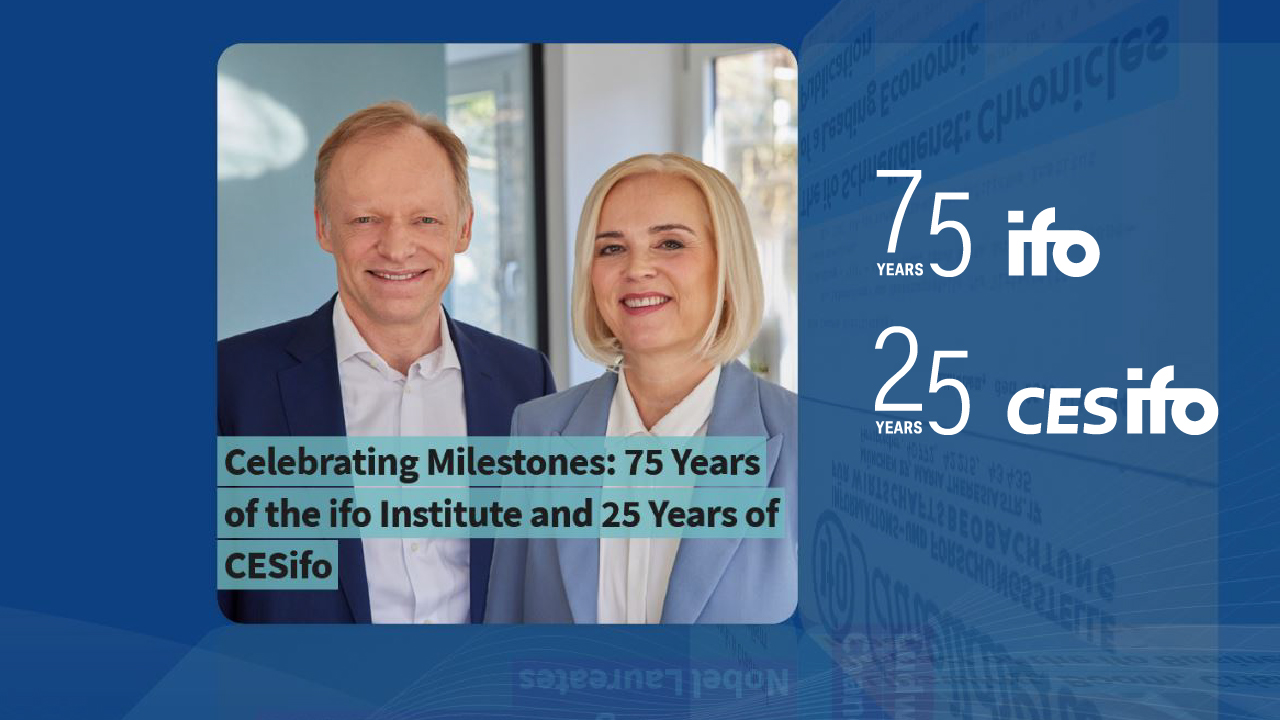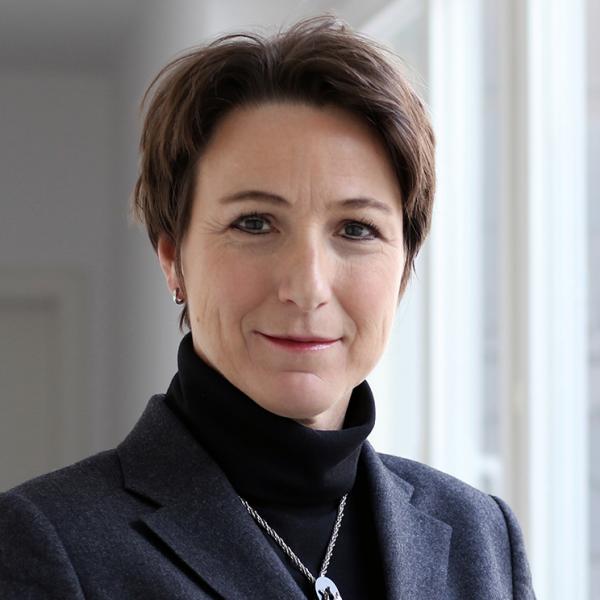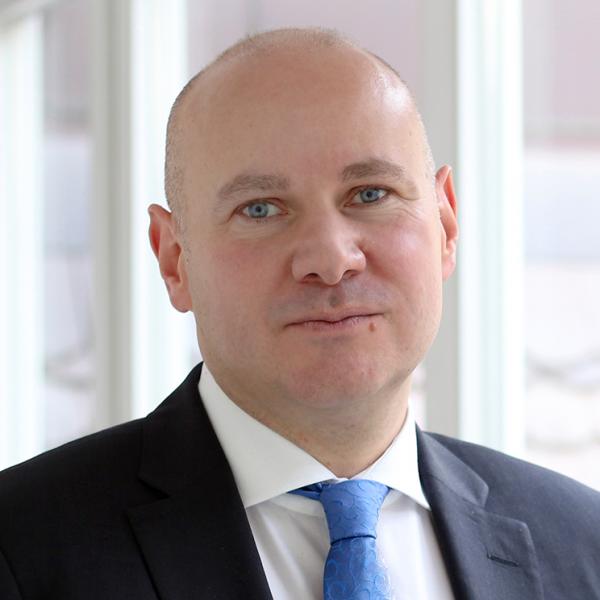ifo Institute: 75 Years of Economic Research and Policy Advice
On January 24, the ifo Institute turned 75 years old. It was born from a merger of two institutes: the Information and Research Center for Economic Observation; and the South German Institute for Economic Research, which Ludwig Erhard had founded in 1946. Today, it enjoys an international reputation for providing excellent economic research and policy advice.

The anniversary year for ifo and CESifo is entitled “75 years of ifo – 75 stories.” Throughout the year, numerous activities will tell the story of ifo’s and CESifo’s past, present, and future. They will feature interviews with people from across ifo, explore different places, and showcase ifo development milestones.

75 Years of the ifo Institute and 25 Years of CESifo
Have you ever considered how deeply the roots of the ifo buildings extend into the history of the Herzogpark? Did you know that the first Schnelldienst appeared even before the official founding of the institute? Or can you estimate how many Nobel laureates are part of the CESifo network? Curious? Then visit us at celebrate.ifo.de, the anniversary website showcasing people, places, and times that shape the history of our institute and network in this jubilee year.
“Unsere Geschichte begann mit der Konjunkturbeobachtung über eigene Befragungen. Heute erschließen wir z.B. neue Datenquellen – Big Data – um ökonomische Entwicklungen schneller analysieren und interpretieren zu können.”
Prof. Dr. Dr. h.c. Clemens Fuest, Präsident des ifo Instituts und von CESifo
Highlights
Playing to Win: How Can Companies Integrate AI into Business Models in a Meaningful Way? How Can Europe Become a World Leader in the Development of AI?
22 Apr 2024
Chamber of Industry and Commerce for Munich and Upper Bavaria, Max-Joseph-Str. 2, 80333 Munich
Adolf Weber: Wegbereiter des deutschen Wirtschaftswunders und des ifo Instituts
ifo Schnelldienst, 2024, 77, Nr. 04, 64-65
Das ifo Institut und die EWG
ifo Schnelldienst, 2024, 77, Nr. 03, 74-75
75 Years of ifo Institute: “Economic and Social Transformation” - Discussion with Theresia Enzensberger, Philipp Blom & Clemens Fuest
4 Mar 2024
Literaturhaus München - Saal/Foyer, 80333 München
What Can We Learn for the Future from the Development of AI?
26 Feb 2024
Chamber of Industry and Commerce for Munich and Upper Bavaria, Max-Joseph-Str. 2, 80333 Munich
„Zutreffendes Kästchen bitte mit 1 bezeichnen!“ – Die Unternehmensbefragungen des ifo Instituts
ifo Schnelldienst, 2024, 77, Nr. 02, 71-72
What Ethical Aspects Should We Consider When Using AI?
5 Feb 2024
Chamber of Industry and Commerce for Munich and Upper Bavaria, Max-Joseph-Str. 2, 80333 Munich
75 Jahre ifo Institut – 76 Jahre ifo Schnelldienst?
ifo Schnelldienst, 2024, 77, Nr. 01, 61-61
History
How it all began: On March 1, 1949, a staff of six full-time and 20 part-time employees started work. Early employees included future Bundesbank presidents Helmut Schlesinger and Karl-Otto Pöhl. In the fall of 1949, company surveys were launched as a new method of monitoring the economy and business cycle. To this day, these surveys are still published monthly in the ifo Business Climate. The abbreviation by which the Institute is known today, ifo, stands for “Information und Forschung” – German for “information and research” – and was added to the name only in 1950. In 1993, ifo’s Munich location was joined by a branch in Dresden. The subsidiary CESifo GmbH – a network of over 2,000 economists worldwide, including several Nobel laureates – was founded in 1999. The network celebrates its 25th anniversary in 2024. Since 2002, ifo has been affiliated with Ludwig-Maximilians-Universität (LMU) in Munich. The latest addition to ifo is the Ludwig Erhard ifo Center for Social Market Economy and Institutional Economics in Fürth, which opened in 2022. In addition to the economy, the ifo Institute today addresses current topics such as climate change, geoeconomics, new technologies, and inequality.
History of CESifo
What does it take to turn a disparate group of economics scholars paying a scholarly visit to Munich, then a backwater in economics, into one of the world’s foremost research networks in the field? Two things: vision, and Hans-Werner Sinn. Long Germany’s most influential economist, HWS built up the network to now more than 2,000 prominent members spread around five continents, created the highly successful CESifo Working Paper series, with now some 11,000 papers published, and turned Munich into a hotbed of economic research, with more than 800 economics events so far. And all of that in barely 25 years.
On our Silver Jubilee, we are proudly looking back and, under the steady hand of Clemens Fuest, HWS's hand-picked successor, also proudly looking ahead, to the next 25 years—and beyond.
History of the ifo Institute
The history of the ifo Institute officially begins in January 1949. Ludwig Erhard, the founder of the Social Market Economy, was an important figure in the founding history of the institute. He laid the foundations for applied policy-oriented economic research in Munich, which still constitutes the ifo today.
Ludwig Erhard and the ifo Institute: In the Service of German Reconstruction
ifo Institute, Munich, 2019
CESifo Forum 20 (2), 32-46
Ludwig Erhard, Adolf Weber and the Difficult Birth of the ifo Institute
ifo Institut, München, 2018
ifo Schnelldienst, 2018, 71, Nr. 13, 14-60


